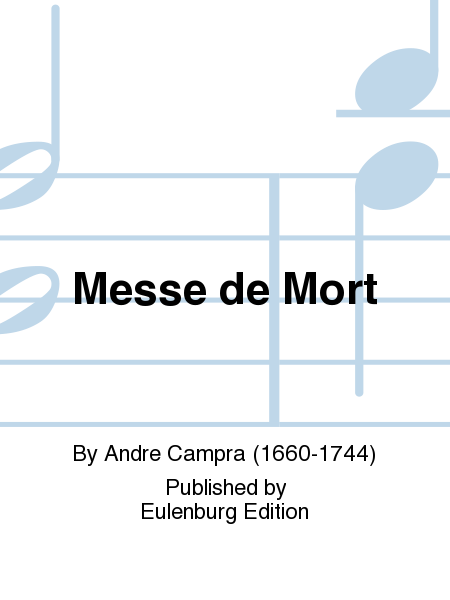Messe de Mort
Requiem
-
Ships in 3 to 4 weeks
Details
Description
SKU: BR.EOS-8047-15
Requiem. Composed by Andre Campra. Edited by Jean-Paul Montagnier. Choir; Softcover. Eulenburg Orchestral Series. Mass; Requiem; Baroque. Part. 24 pages. Duration 55'. Breitkopf and Haertel #EOS 8047-15. Published by Breitkopf and Haertel (BR.EOS-8047-15).ISBN 9790004789735. 8.5 x 11.5 inches.
Among Campra's Latin works, the ,Messe de mort' is perhaps one of the more successful and today it is one of the more frequently performed. It is also the most enigmatic score of his entire output. Despite extensive researches, no evidence of any sort has yet been brought to light to document its origin, purpose, date of composition, first performance or reception. A stylistic analysis indubitably supports the contention that the ,Messe de mort' is a late work, composed perhaps between 1722 and 1729.
The present edition is based on the manuscript from the Bibliotheque Nationale de France (Paris). It it the oldest known source of the work. The very few errors have been corrected.
(Jean-Paul Montagnier) Vokalensemble Stuttgart und den Kammerchor des Kopernikus-Gymnasiums Wasseralfingen. Fur diese beiden ganz unterschiedlichen Chorformationen hat Martin Smolka 2012 auch gezielt seine Partitur angelegt. Biografisch ist das Agnus Dei eine Art kleines Requiem fur seinen kurz zuvor verstorbenen Vater. Das liturgische Agnus Dei rahmt den deutschen Text Eh das Madchen entschlief ... der bei Auffuhrungen in anderen Landern durch eine Ubersetzung ersetzt werden soll.
Der SWR-Redakteur Hans-Peter Jahn schreibt dazu im Programmheft: Die fur Smolka typischen minimalistischen Taktzellen schaffen eine archaische Sinnlichkeit. Eine einfache und zugleich streng gebaute Vokalmusik mit Tiefenwirkung.
Nach der Urauffuhrung war die Esslinger Zeitung hellauf begeistert: Smolka ist ein Meister der Stimmbehandlung und der chorischen Klanggestaltung. Im Zentrum des Stucks gerat die Musik zum Stillstand: im leisen gleichmassigen Summen uber dem plotzlich fortissimo ein tschechisches Kinderlied erklingt eines das der Vater seinen Kindern haufig vorgesungen hat. Das alles war sehr beruhrend. Und eigentlich noch mehr als das. My father PhDr. Jaroslav Smolka (1933-2011) was a leading Czech musicologist author of books Czech Cantata and Oratorium Fuga in Czech Music Smetana's Orchestra Music Smetana's Vocal Music monography of Jan Dismas Zelenka and many others. He was a legendary teacher of Music History at Prague Music Academy critic recording producer composer; for almost 50 years he was an important and highly respected personality of Prague musical life.
My father devoted a lot of time and energy to musical education and activities of my sister and me using often quite original methods such as teaching of intervals and counterpoint through Bartok's Microcosmos ear training filling all imaginable moments of everyday life or lessons of harmony analysis starting with Overture to Tristan and Musorgsky's Catacombs. The Martinu song Wondering Maiden was his solo number in our home vocal productions which he used to sing with amazing devotion while his huge voice was audible in several neighboring streets.
My Agnus Dei is closely bound to all this history e.g. by using canon and preferring beauty of dissonant seconds like Bartok or quoting Martinu and his refined neoclassical harmony. Father would be probably a bit critical about the minimalistic monotony of the main body of the piece. Nevertheless firstly he would improvise a short lecture of history of Agnus Dei in Requiem in Czech Music naming by heart many dates and all examples of changes of order of the traditional text by composers. Examples would be sung probably.
(Martin Smolka).

 Share
Share